- Investigator
- Thomas J George
- Status
- Accepting Candidates
Colorectal cancer
Definition
Colorectal cancer is cancer that starts in the large intestine (colon) or the rectum (end of the colon).
Other types of cancer can affect the colon. These include lymphoma, carcinoid tumors, melanoma, and sarcomas. These are rare. In this article, colon cancer refers to colorectal cancer only.
Patient Education Video: Colon cancer
Alternative Names
Colorectal cancer; Cancer - colon; Rectal cancer; Cancer - rectum; Adenocarcinoma - colon; Colon - adenocarcinoma; Colon carcinoma
Causes
In the United States, colorectal cancer is one of the leading causes of deaths due to cancer. Early diagnosis can often lead to a complete cure.
Almost all colon cancers start in the lining of the colon and rectum. When doctors talk about colorectal cancer, this is usually what they are talking about.
There is no single cause of colon cancer. Nearly all colon cancers begin as noncancerous (benign) polyps, which slowly develop into cancer.
You have a higher risk for colon cancer if you:
- Are older than 45
- Drink alcohol
- Smoke tobacco
- Are obese
- Are African American or of eastern European descent
- Eat a lot of red or processed meats
- Have colorectal polyps
- Have inflammatory bowel disease (Crohn disease or ulcerative colitis)
- Have a family history of colon cancer
Some inherited diseases also increase the risk of developing colon cancer. One of the most common is called Lynch syndrome.
What you eat may play a role in getting colon cancer. Colon cancer may be linked to a high-fat, low-fiber diet and to a high intake of red meat. Some studies have found that the risk does not drop if you switch to a high-fiber diet, so this link is not yet clear.
Symptoms
Many cases of colon cancer have no symptoms. If there are symptoms, the following may indicate colon cancer:
- Abdominal pain and tenderness in the lower abdomen
- Blood in the stool
- Diarrhea, constipation, or other change in bowel habits
- Narrow stools
- Weight loss with no known reason
Exams and Tests
Through screening tests, colon cancer can be detected before symptoms develop. This is when the cancer is most curable.
Your doctor will perform a physical exam and press on your belly area. The physical exam rarely shows any problems, although the doctor may feel a lump (mass) in the abdomen. A rectal exam may reveal a mass in people with rectal cancer, but not colon cancer.
Certain tests used to screen for colon cancer may suggest colon cancer. A sigmoidoscopy, or more likely, a colonoscopy, will be done to evaluate any normal results.
Only a full colonoscopy can see the entire colon. This is the best screening test for colon cancer.
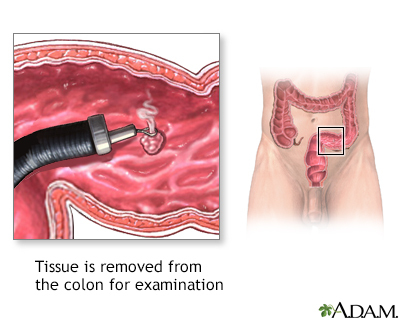
Blood tests may be done for those diagnosed with colorectal cancer, including:
- Complete blood count (CBC) to check for anemia
- Liver function tests
If you are diagnosed with colorectal cancer, more tests will be done to see if the cancer has spread. This is called staging. CT or MRI scans of the abdomen, pelvic area, or chest may be used to stage the cancer. Sometimes, PET scans are also used.
Stages of colon cancer are:
- Stage 0: Very early cancer on the innermost layer of the intestine
- Stage I: Cancer is in the inner layers of the colon
- Stage II: Cancer has spread through the muscle wall of the colon
- Stage III: Cancer has spread to the lymph nodes
- Stage IV: Cancer has spread to other organs outside the colon
Blood tests to detect tumor markers, such as carcinoembryonic antigen (CEA) may help the doctor follow you during and after treatment.

Treatment
Treatment depends on many things, including the stage of the cancer. Treatments may include:
- Surgery to remove the tumor
- Chemotherapy to kill cancer cells
- Radiation therapy to destroy cancerous tissue
- Targeted therapy to keep cancer from growing and spreading
SURGERY
Stage 0 colon cancer may be treated by removing the tumor using colonoscopy. For stages I, II, and III cancer, more extensive surgery is needed to remove the part of the colon that is cancerous. This surgery is called colon resection (colectomy).
CHEMOTHERAPY
Most people with stage III colon cancer receive chemotherapy after surgery for 3 to 6 months. This is called adjuvant chemotherapy. Even though the tumor was removed, chemotherapy is given to treat any cancer cells that may remain.
Chemotherapy is also used to improve symptoms and prolong survival in people with stage IV colon cancer.
You may receive just one type of medicine or a combination of medicines.
RADIATION
Radiation therapy is sometimes used for colon cancer.
For people with stage IV disease that has spread to the liver, treatment directed at the liver can be used. This may include:
- Burning the cancer (ablation)
- Delivering chemotherapy or radiation directly into the liver
- Freezing the cancer (cryotherapy)
- Surgery
TARGETED THERAPY
- Targeted treatment zeroes in on specific targets (molecules) in cancer cells. These targets play a role in how cancer cells grow and survive. Using these targets, the drug disables the cancer cells so they cannot spread. Targeted therapy may be given as pills or may be injected into a vein.
- You may have targeted therapy along with surgery, chemotherapy, or radiation treatment.
Support Groups
You can ease the stress of illness by joining a colon cancer support group. Sharing with others who have common experiences and problems can help you not feel alone.
Outlook (Prognosis)
In many cases, colon cancer is treatable when caught early.
How well you do depends on the stage of the cancer and other factors. When treated at an early stage, many people survive at least 5 years after diagnosis. This is called the 5-year survival rate.
If the colon cancer does not come back (recur) within 5 years, it is considered cured. Stages I, II, and III cancers are possibly curable. In most cases, stage IV cancer is not thought to be curable, but there are exceptions.
Possible Complications
Complications may include:
- Blockage of the colon, causing bowel obstruction
- Cancer returning in the colon
- Cancer spreading to other organs or tissues (metastasis)
- Development of a second primary colorectal cancer
When to Contact a Medical Professional
Call your health care provider if you have:
- Black, tar-like stools
- Blood during a bowel movement
- Change in bowel habits
- Unexplained weight loss
Prevention
Colon cancer can almost always be caught by colonoscopy in early stages, when it is most curable. All adults age 45 and older should have a colon cancer screening. How often you should have screening depends upon the test being used.
Colon cancer screening can often find polyps before they become cancerous. Removing these polyps may prevent colon cancer.
People with certain risk factors for colon cancer may need earlier testing (before age 45) or more frequent testing.
A healthy lifestyle also may help reduce your risk for colon cancer:
- Get regular physical activity.
- Don't smoke or use tobacco.
- Maintain a healthy weight.
- Eat a diet rich in fruits and vegetables and low in red and processed meats.
Gallery









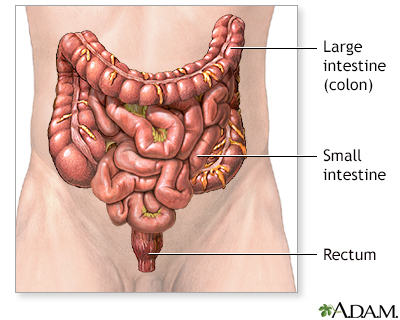
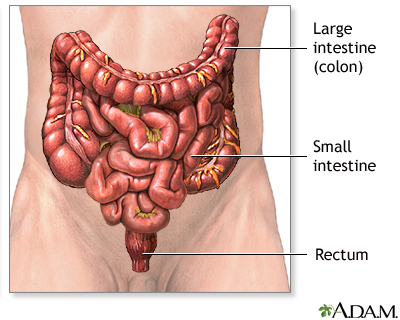
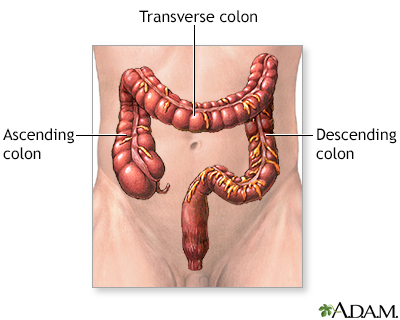
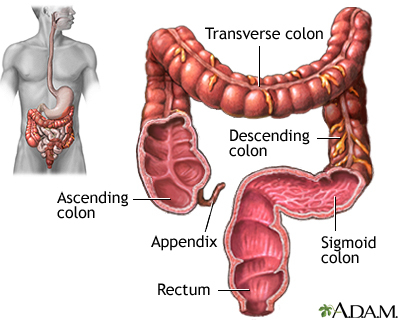
References
National Cancer Institute website. Colorectal cancer prevention (PDQ) - health professional version. www.cancer.gov/types/colorectal/hp/colorectal-prevention-pdq. Updated April 21, 2022. Accessed April 28, 2022.
National Comprehensive Cancer Network website. NCCN clinical practice guidelines in oncology (NCCN Guidelines). Colorectal cancer screening. Version 1.2022 - March 4, 2022. https://www.nccn.org/professionals/physician_gls/pdf/colorectal_screening.pdf. Updated March 4, 2022. Accessed April 28, 2022.
Qaseem A, Crandall CJ, Mustafa RA, et al. Screening for colorectal cancer in asymptomatic average-risk adults: a guidance statement from the American College of Physicians. Ann Intern Med. 2019;171(9) :643-654. PMID: 31683290 pubmed.ncbi.nlm.nih.gov/31683290/.
Rex DK, Boland CR, Dominitz JA, et al. Colorectal cancer screening: recommendations for physicians and patients from the U.S. Multi-Society Task Force on Colorectal Cancer. Am J Gastroenterol. 2017;112(7):1016-1030. PMID: 28555630 pubmed.ncbi.nlm.nih.gov/28555630/.
US Preventive Services Task Force website. Final recommendation statement. Colorectal cancer: screening. www.uspreventiveservicestaskforce.org/uspstf/recommendation/colorectal-cancer-screening. Published May 18, 2021. Accessed April 28, 2022.
Related specialties
Aftercare and more
- Abdominal radiation - discharge
- Bland diet
- Changing your ostomy pouch
- Chemotherapy - what to ask your doctor
- Ileostomy - caring for your stoma
- Ileostomy - changing your pouch
- Ileostomy - discharge
- Ileostomy - what to ask your doctor
- Ileostomy and your child
- Ileostomy and your diet
- Large bowel resection - discharge
- Living with your ileostomy
- Pelvic radiation - discharge
- Radiation therapy - questions to ask your doctor
- Small bowel resection - discharge
- Total colectomy or proctocolectomy - discharge
- Types of ileostomy
Clinical Trials: Colorectal cancer
UF Health research scientists make medicine better every day. They discover new ways to help people by running clinical trials. When you join a clinical trial, you can get advanced medical care. Sometimes years before it's available everywhere. You can also help make medicine better for everyone else. If you'd like to learn more about clinical trials, visit our clinical trials page. Or click one of the links below:
The primary objective of this study is to assess the sensitivity for colorectal cancer (CRC) and specificity of the mt-sDNA 2.0 test.
- Status
- Accepting Candidates
- Ages
- 40 Years - N/A
- Sexes
- All
This phase III trial compares total ablative therapy and usual systemic therapy to usual systemic therapy alone in treating patients with colorectal cancer that has spread to up to 4 body sites (limited metastatic). The usual approach for patients…
- Investigator
- Kathryn E Hitchcock
- Status
- Accepting Candidates
- Ages
- 18 Years - N/A
- Sexes
- All
Community and Patient Programs: Colorectal cancer
Our community and patient programs provide great value to patients, families and loved ones. People can find support, educational materials, expert consultants and more. In most instances, these programs are offered free of charge.
-
Adult Cancer Survivorship Program
Improves health and quality of life for long-term cancer survivors.
-
Cancer Connections
An educational and networking event that brings together cancer patients, survivors, caregivers and health care professionals.
-
Criser Cancer Resource Center
Interdisciplinary facility that helps support the diverse needs of individuals and families.
-
Pain Management - Cancer
Pain management treatment plans for cancer patients.
-
Project CONTINUITY
Helps individuals access high-quality cancer screening, prevention and treatment services.
-
Social Workers for Cancer Patients
Can assist you through the treatment process in a number of practical and supportive ways.
-
Streetlight
Peer companionship for adolescents and young adults living with serious illness.
-
UF Health Wellness University
Offers classes, programs, groups, activities, resources and health fairs throughout Gainesville, Ocala and The Villages communities.
Calendar Events and Lectures: Colorectal cancer
Gainesville, FL 32641
Learn about new colorectal cancer treatments, early detection and prevention from UF Health cancer experts.Get a free colorectal cancer screening…

News and Patient Stories: Colorectal cancer
The Importance of Colorectal Cancer Screening: How Early Detection Saves Lives
Colorectal cancer ranks as the second leading cause of cancer-related deaths in the United States. Referred to as a “silent killer” due to its lack of…

Novel compound opens new avenue in immunotherapy treatment for cancers
February 9, 2024
A team of UF Health Cancer Center researchers have developed a first-of-its-kind compound that could open a new avenue for using immunotherapy to treat various…
College of Medicine, College of Pharmacy, UF Health Cancer Center, +2 more
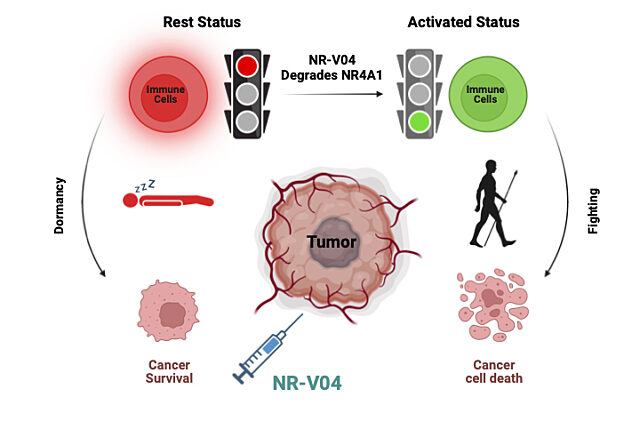
Latest podcast episodes
Sweetened beverages can heighten colorectal cancer risk
Here’s another reason to reconsider that sugary drink: For women under age 50, it increases the risk of colorectal cancer. The findings also are not just a cautionary tale for adult women. Heavy...
A new age for colorectal cancer screening
New colorectal cancer screening guidelines no longer make colonoscopies a rite of passage for 50-year-olds. Instead, people can celebrate their mid-40s by making an appointment for a procedure most...
One slice of bacon raises colorectal cancer risk
Bacon lovers, take note: The salty, savory meat treat comes with a risk. People who ate just one slice of bacon a day had a 19 percent greater risk of colorectal cancer. That’s one of the findings...
